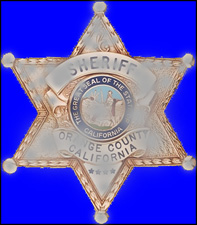 |
People who follow criminal justice remember well the jury in the O.J. Simpson criminal trial. It was that jury who renewed public interest in jury nullification. That jury’s verdict left a bad taste in many people’s mouths. Sometimes, juries follow the court’s instructions, consider only the admitted evidence, and arrive at a just verdict which they found personally distasteful. That appears to be what happened in Orange County, California, a few days ago. |
My November 7, 2008, post titled A Tutorial On Public Corruption provided testimonial and recorded evidence offered during the trial of former Orange County, California, sheriff Michael Carona.
On January 16, 2009, a federal jury in Orange County acquitted former sheriff Carona on five charges and convicted him on one witness tampering charge. He could receive up to 20 years in federal prison for that conviction, but under the federal sentencing guidelines, a sentence ranging from probation to 41 months in prison is more likely.
The verdict was reported in the Los Angeles Times and the Orange County Register. The stories make it clear that jurors believed Carona was guilty of some or all of the other charges. Equally clear, though, is the jurors listened to and abided by the judge’s instructions and put their own personal feelings aside to render a just verdict based on the facts and the court’s application of the law.
That is exactly what jurors are supposed to do.
Here is a hypothetical situation readers as prospective jurors might want to consider. Suppose you have been summoned for jury duty (federal or state, it really doesn’t matter). You are sent to a courtroom for voir dire. You learn that the defendant is a local public official accused of crimes of public corruption. To your surprise, the official is someone you know either personally or by reputation having grown up with him (or her) in Kootenai County. Based on what you have heard and read or otherwise learned, you have an opinion about the defendant’s character. You have not formed an opinion about his (or her) innocence or guilt.
(1) How would you answer the judge when asked if you could put aside your personal knowledge and feelings about the defendant and render a verdict based on the facts admitted into evidence and the law as instructed by the court?
(2) During deliberation, how would your future social, political, or economic position in the community affect your verdict? For example, if you perceive there to be a culture of intimidation and retaliation in the community, how would that perception influence your verdict? Knowing that your vote for acquittal or guilt could be revealed publicly, how would that affect your deliberation and decision?
(3) If you believe that the defendant couldn’t possibly have committed the crimes for which he (or she) has been accused, would you volunteer that information to the judge during voir dire even though neither attorney had elicited that information from you? Why?

1. You answer honestly. If the lawyer doesn’t like you, you get dismissed.
2. If the culture of intimidation already exists and you run a business in town, then you’re already subject to it. You’re either on the inside and favor acquittal to maintain your status, or you’ve been threatened and know you must acquit. If you’re on the outside and are aware of the situation, you haven’t yet made it past #1.
3. I’ve served on several panels and I’ve never known any citizen to be so bold. Hopefully the voir dire questions result in such a person not making it to that stage of the game.
By the way, I’ve never known the court to announce what the case is about until after the panel is seated. They may give a frame of reference, such as public intoxication, domestic abuse, or something broad. But on the panels I’ve sat on they’ve never come out and said, “Mr. Johnson is accused of intimidating public employees” or some such. They wait until after you’re seated before they say what the charge is, at least in my experience. Then they cite the specific law before you deliberate.
The tough part is the specific law. On one case I sat on here in Kootenai Co., the law was misapplied. I could see it right away, but other members of the panel couldn’t. They wanted to know more information, they wanted to know the entire statute, which isn’t allowed. Given only the snippet of law we had, the guy was not guilty. Also, we as a panel felt the law was dumb and, in theory, could be used against anyone for any reason. So, in a sense, we nullified.
Comment by Dan — January 20, 2009 @ 2:02 pm
I sat on two juries, one civil and one criminal (homicide), in LA Superior Court. Federal law enforcement officers were not ‘peace officers’ exempted from jury duty in CA. The civil case was in Torrance, and the criminal case was in Compton. In both cases the jury pool was brought into the court room, and the defendant and all witnesses were identified. If and when a jury pool member was called to be questioned, one of the first questions from the court was if the prospective juror knew the defendant or any of the defendant’s family or business partners, and if the juror knew any of the witnesses.
Comment by Bill — January 20, 2009 @ 2:26 pm